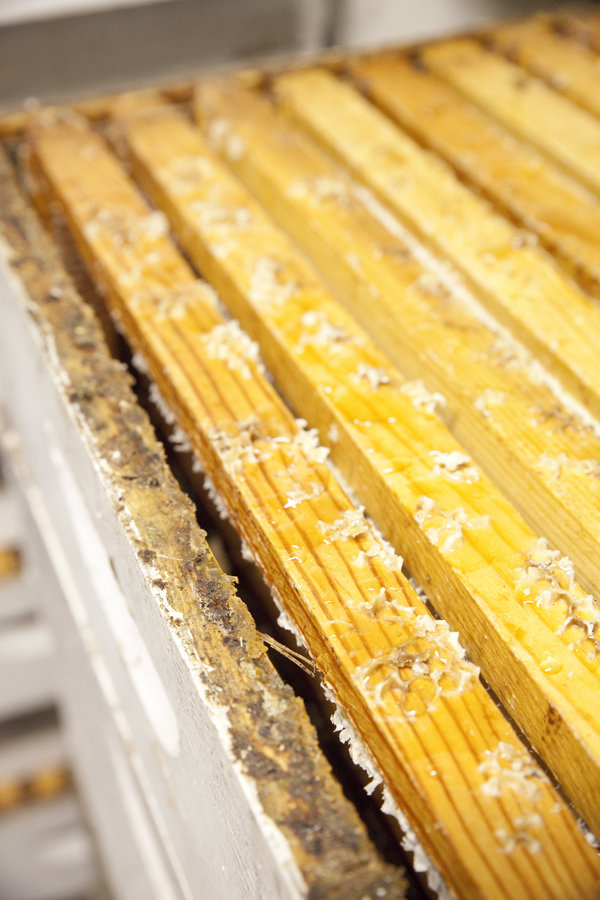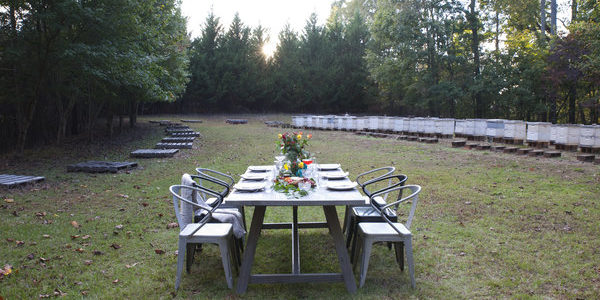Interview with John Wright:
How Do Bees Know…?
One of the things we’ve noticed at farmers markets and events is that our customers are very interested in beekeeping. Since Bee Wild’s owner, John Wright, is a third generation bee farmer, we thought everyone might appreciate hearing him talk about beekeeping and what he’s learned by being brought up on the farm.
Today’s Topic: How Do Bees Know…?
QueenBee: Hi! this is QueenBee from Bee Wild. I have the pleasure this afternoon of doing another interview with John Wright, the owner of Bee Wild.
QueenBee: John, for those no familiar with the Bee Wild story, tell us something about growing up on the honey farm, please.
John: Oh, sure, Queen Bee. Growing up on the farm was quite a unique experience. It was one of those things where every day there was something different. Unlike a lot of other farming like corn or other traditional farming, you just never knew what was going to pop up. Things are always evolving and changing with the bees. So, it was always very interesting just to talk to my Dad, the beekeeper, to learn what was happening with the bees at that time, what the challenges were, what the good news was, what the bad news was, anything like that. It was so fun to taste each little batch of honey that came in every season because it always taste’s different, based on where the bees were, what flowers they were working, and what was blooming at the time, and all of that.
QueenBee: So, are you saying on the honey farm, all the work is focused on the bees?
John: Yes. It’s very much focused on the bees. The health and vitality of the bees is the most important part of having a successful honey business. You definitely don’t get much honey if you don’t take care of the bees and if they are not healthy.
QueenBee: I’ll bet you’ve watched those honey bees and their hives quite a lot over the years.
John: Oh, yeah. Absolutely.

QueenBee: I’d like to ask a few questions about what you have noticed when you’ve been watching the honey bees and when you and your Dad, the beekeeper, have been focused on the honey bees. These are questions that some of our customers have submitted, and it’s information they are very interested in. So, let me go to the first one.
QueenBee: How do honey bees know what to do to sustain life in their hive?
John: That’s a great question. We get that question a lot. The way they know what to do is through their hive mind. That is something they are just born with, which connects all of them together. Every bee in the colony is very interconnected. They are classified as a super-organism, the same classification as ants. This allows them to communicate in very unique ways and to cooperate with each other and work together. The interesting thing is they don’t just think like humans do, they know. They know exactly what to do, when to do it. They know what’s going on in the hive. So, it’s been observed many, many times and researched and proven. It’s a very fascinating aspect of beekeeping that we continue to learn more from, because there’s so much to observe in the hive at any given time.
QueenBee: Great, thank you. When do you schedule honey harvesting and extracting?
John: That’s a good question, too. So, the interesting thing is that we don’t schedule the harvesting or extracting because we are always working in cooperation with the bees. It’s actually more up to the bees and Mother Nature than it is us. Of course, we would love to have a projected date so that we could plan out a month or two in advance. But, it doesn’t work that way because things change on a dime with the bees. We have to work with them. Otherwise, beekeeping doesn’t work. Working with the bees is the only way to have a sustainable honey bee farm that’s thriving.
John: For example, we are experiencing a rainy period. If we have just a few days of rain, that can throw off our harvesting and extracting schedule. It’s the same thing if we have great weather. If the bees and healthy and thriving, we might even do the harvesting and extracting sooner than we thought. The bees may have produced more honey than we have expected, in a shorter amount of time. So, we are constantly checking on the bees to see where we’re at. We are very present and aware of each colony, what’s going on with the colony.
QueenBee: So, what can you do to help honey bees if they are sick or dying?
John: If the honey bees are sick or dying, it goes back to the last point about being in cooperation with Mother Nature and the bees. So, we have to be a total team because each colony is going to be expressing something different and is going to be giving us different clues about what is going on. So, we have to go into each one, open up the hive, and really just do investigation and see what the colony needs. Then, we do our best to give that hive some extra honey or an organic protein patty to give them extra nutrition. Of, we give them essential oils to help build their immune systems. Different things like that can help get the colony stronger and rehabilitated. Sometimes sadly there’s nothing we can do because it’s too late, and there’s too much fallout and die-off. Then, we have to go ahead and plan on replacing the bees in those hives with new bees. We try to prevent that as much as possible. But, to reiterate, the main thing is just that we are always in a cooperative state of mind with the bees and not in a “dominion over them” type of mindset, because that does not work with the bees.
QueenBee: Have you been able to carry this idea forward into your own life?
John: Yes. The bees have taught us so much about sustainability and being in cooperation with Mother Nature, with each other, with the Planet. We find, and I personally find that more I apply these concepts and principles to anything in my life, everything becomes easier. Everything becomes more in the flow and happens organically without having to force it or push on it or trying to manipulate anything to make things happen. Often times, it’s surprising how things can work out even better than you expect when you open up to this type of dynamic. A good example is that I find that even working with the team for Bee Wild that instead of being by the book and managing the team or having a bunch of rules that everybody has to follow, I find that if I treat everyone as an individual and allow everyone to be who they are and do my best to create a win/win scenario at any given time in any given situation, it ends up producing a much better result for them and for me. It’s better than if I had tried to force my power over someone of I try to force someone to do something they really don’t want to do. So, it has been a very enriching and valuable lesson to learn. We constantly work on applying it. It’s something we constantly have to practice.
QueenBee: Would you like to give us an update on what the bee season has held so far for the bees and for the farm.
John: Absolutely. So far, we’ve had a very wet season. In the Atlanta Metro area we’ve been getting on average about a 30 minute shower every day. In the mountains where the bees are, it’s raining at least double that. So, we’ve been getting quite a bit of rain which has made it so the bees have a very limited time window each day that they can collect pollen and nectar and water and forage and make it back to the hive before the thunderstorms and rains come. So, we’ve been getting a little bit of honey, but we are only at about 25% of what an average yield is on our harvest. The good news is that is just for the Wild Flower Honey, and the Sourwood Crop is going to be finishing up within a few days. Once the bees finish with the Sourwood crop, we hope to look into the hives and see more honey than we expect. Results on Sourwood are to be announced.
QueenBee: Thanks a lot for answering those questions. I just wanted to let our readers and customers know that John Wright and QueenBee are always available to answer questions. You can leave your question(s) as comments or messages on our Facebook page, Twitter feed, and Instragram feed. We are BeeWildBuzz, and we’re always buzzing around. Again, if you contact us, we would be glad to answer your questions. Too, John does visit children’s schools when they are in session with a demonstration hive. You can always get in touch with him about that.
For those readers and customers who would like to listen to the interview, here it is:








